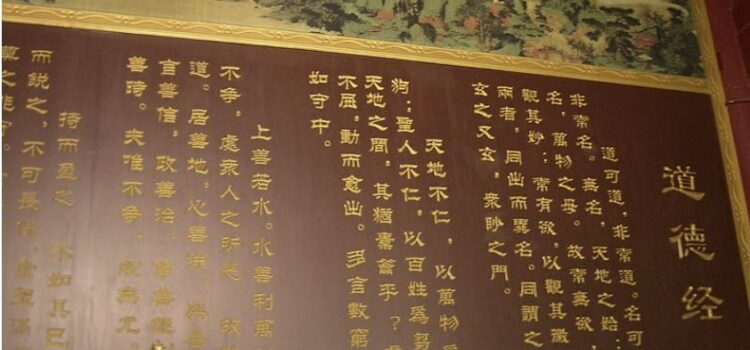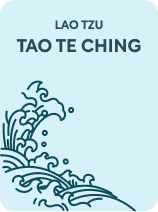

This article is an excerpt from the Shortform book guide to "Tao Te Ching" by Lao Tzu. Shortform has the world's best summaries and analyses of books you should be reading.
Like this article? Sign up for a free trial here .
What does the Tao Te Ching teach? What are the beliefs and virtues of Taoism?
The Tao Te Ching is the foundational text of Taoism. The spiritual text was written as a poem and has been translated and interpreted by many over the years. The book discusses the nature of the Tao, objectivity and balance, non-action, and harmonious living.
Continue on for more information about the Tao Te Ching.
The Tao Te Ching
The Tao Te Ching is one of the foundational texts of Taoism, written between the 4th and 6th centuries. This summary is based on the Stephen Mitchell translation, which modernizes much of the text.
While we have done our best to research the text and offer an accurate representation of the Tao Te Ching, areas of this summary are based upon interpretation. The piece is written as poetry and, as such, even Taoist scholars have different perspectives on what the language represents.
This summary is structured thematically, with each section pulling information from various sections of the text to best explain the ideas introduced in the work. We’ll discuss:
- The nature of the Tao
- Objectivity and balance
- Non-action
- Harmonious living
The Nature of the Tao
Older than any deity, the Tao is the natural order of the universe. It’s the guiding energy that lives within us and connects us to everything around us. Also known as the “Great Mother,” it paradoxically creates nothing while offering infinite energy to all beings, nurturing and caring for them.
As an omnipresent entity, the Tao is eternal and infinite. It was never born or created, and, therefore, it can never die or be destroyed. The Tao has no biases, being unconditionally available to all beings who want to live according to its teachings.
Because it’s beyond the comprehension of human beings, the workings of the Tao can’t be described or understood, only experienced. The more that you try to understand the workings of the Tao, the less you’ll be able to engage with it.
The Master of Taoist Practices Versus the Average Person
A master of Taoist practices only concerns themselves with the Tao. By focusing solely on the objective truths of the universe, they avoid falling victim to their own prejudices. Conversely, the average person often engages with more shallow levels of faith, often using shows of faith to bolster their own biased view of the world.
A master is powerful because they don’t seek power. By not searching for more power, they are able to use the strength that the universe has given them effectively. Conversely, the average person is never powerful because they’re always seeking power, blinding them to the strength the universe has already given them.
A master never leaves anything incomplete because they never do anything without the universe’s prompting. In being selective with their actions in this way, they never take on more than they can accomplish. Conversely, the average person frequently leaves things incomplete because they take on more than they can accomplish.
Objectivity and Balance
To live according to the Tao, strive to achieve balance through objectivity. The Tao is the birthplace of all things and doesn’t discriminate between “good” and “evil.” In the same way, you must embrace all people and things, disregarding any sense of personal perspective and removing the concepts of “good” and “evil” from your mind.
When we label or define our surroundings, we create conflict, attributing particular qualities based on our personal biases. This manipulates our view of reality. For example, if you define modesty as “good,” then you’ll inherently paint anything you view as indecent as “evil.”
Instead of attributing qualities to the world around you, embrace things as they take their natural course. Don’t linger on the past or the future. Exist in the present, engaging with whatever the universe has brought you.
For instance, if the sun is shining, enjoy that moment of warmth. However, if it suddenly begins to rain, instead of mourning the loss of sunlight, embrace the refreshing droplets. Don’t label one as “good” and one as “bad.” Instead, enjoy the present moment.
Being Skeptical of “Knowledge”
To remain objective, you must be skeptical of “knowledge.” Knowledge is gained by learning new things. It can create a warped perspective as it’s often gained through biased sources, making it harder to remain objective and receptive to the calls of the Tao.
To prevent your knowledge from tainting your objectivity:
- Talk less. This will help you to remain objective, patient, and receptive to the energies around you as well as to the Tao itself. When people talk too much, they’re trying to prove their knowledge instead of embracing the wisdom of the Tao.
- Don’t presume that you have the answer. If you assume that you have enough knowledge to solve problems, you can’t remain receptive to the world around you. Accept that you don’t know everything and keep an open mind.
- Be independent. Don’t allow the “knowledge” of others to corrupt your relationship with the Tao. Your relationship to the Tao is unique and personal. When people lose their connection with the Tao, they turn to religion. Priests and gurus may offer guidance, but their guidance is derived from their own knowledge and understanding of the world, not the objective reality that only the Tao can reveal to you. It’s up to you to develop your relationship with the universe.
Chaos, Conflict, and Failure
If you stay centered within the Tao’s objective wisdom instead of relying on your own biased perspective, the chaos of life won’t cause you to spiral. Whether in anguish or in bliss, don’t let your emotions influence your perspective. Instead, rely on the Tao for guidance.
If you engage with the objectivity of the Tao in your daily life, you’ll be able to engage with it in crisis. Instead of overwhelming yourself with the big picture, take things day-by-day, completing small tasks as they arise. This daily practice in objectivity will allow you to remain unbiased in the most extreme of circumstances.
If you find yourself in conflict with someone else, respect your foe and don’t underestimate their abilities. If you underestimate your enemies, you’ll make careless mistakes and reckless decisions. Holding your opponent in high esteem will let you know when to take action and when to be patient as your bias won’t create a false sense of security or confidence.
When engaged in conflict, remember the following:
- Show kindness to all people, even those that are unkind.
- Be trusting of all people, even those that are untrustworthy.
This helps you remain an unbiased vessel that’s willing to connect with all people, even those others have deemed “bad.”
Non-Action
While we make things using tangible material, it’s often the intangible space within these entities that we use in our daily lives. For example, while a house is made from wood or brick, it’s the empty space on the inside that people utilize for living.
To create usable emptiness in your life, embrace non-action (also known as wu wei, or 无为), or the willingness to remove personal desire and act only when the time is right. This makes you a vessel for the universe to utilize for a greater purpose that you may not understand.
Letting Go of Ambition
To embrace non-action, you must let go of ambition as it blinds you to your surroundings and causes you to act out of personal desire. Compare ambition to a loud noise. If all you can hear is that one loud noise, you’ll miss all of the small, more intricate noises surrounding you. Similarly, if you only focus on your ambition, you’ll miss the more intimate moments that are occurring right in front of you.
Don’t buy into your desires. Remove yourself from earthly ambitions, avoiding selfish or manipulative behavior in the process. This will separate you from those who are too wrapped up in their own perspective to be guided by the world around them.
Excess and External Validation
To embrace non-action, you must also let go of the need for material excess and external validation. If you strive to meet society’s barometers for “success,” it’s easy to become consumed by your desire for status, causing you to make decisions that satiate this desire instead of waiting for the guidance of the Tao.
Society’s barometers for success often relate to wealth and power, both tempting forces. These forces lead to classist and violent societies, both of which run counter to the Tao. For example, if society values wealth, the desire to become wealthy can become greater than the desire to live harmoniously with your surroundings.
Furthermore, the concept of “chasing status” relies on the idea that you need “more” to be happy. The desire for more can destroy you, as obtaining it often requires that you ostracize the people around you. For example, if you chase after money, you may spend less time with your loved ones or friends in an effort to climb the corporate ladder.
Instead of trying to make the world bend to your desires, let go of the concept of “success” and remain internally focused. To eliminate your need for material excess and external validation:
- Take the time to understand your place in the universe instead of investing energy into the demands of others. Understanding others gives you knowledge, but understanding yourself gives you wisdom.
- Don’t dwell on the opinions of other people. Instead, focus on your own journey with the Tao, listening to the universe and engaging with the world as it comes to you.
- Do the earthly work the universe calls you to do, but then walk away from it. If you dwell on it, you’ll become a slave to excess or validation as you’ll become engrossed with the material rewards of your earthly work. When you realize that the universe has given you everything that you need, you’ll feel content.
Earthly pleasures and “success” may provide distraction through enjoyment, but the Tao, though seemingly mundane, provides true fulfillment.
Patience
A final element of embracing non-action is being patient and allowing the Tao to guide your behavior. You can’t seek out the “right time” to act as this will inherently put your personal desires into your decisions.
Instead, you must wait for the moment to come to you, thus allowing you to interact with the world based on how it actually is instead of how you want it to be. If you’re searching for fulfillment in earthly desires, you’ll never be truly patient and observant because you’ll try to force things to happen before the universe is ready.
For example, if you want a promotion at work, you may try to take action to “prove yourself” to your boss. This action comes from a personal desire for external validation. While chasing this promotion, you’d likely become so focused on your task that you’d miss the opportunities that would’ve naturally arisen had you been patient enough to wait for the universe’s guidance.
Though you will spend most of your time waiting for the Tao’s guidance, when you do feel moved by the Tao, allow yourself to feel its impact completely. You may not fully understand why you’re feeling what you’re feeling, but this shouldn’t prevent you from fully embracing your emotions. For example, if you feel the sudden urge to cry, allow yourself to cry. If you feel the sudden urge to laugh, allow yourself to laugh.
This helps you accept what the universe gives you, even in moments of loss or sorrow. For example, if a loved one passes away, you may feel extreme sorrow. In that moment, allow yourself to grieve. However, once the emotion begins to fade, don’t allow yourself to hold on to it. Let it go and re-engage with the workings of the Tao.
Harmonious Living
To achieve harmony, understand your place in the world and work to fulfill the function the universe requires of you—nothing more, nothing less. Contrary to popular belief, you can’t improve the world. It’s sacred, and, if you try to change it, you’ll lose touch with it. Instead, focus on what the universe requires of you, and you’ll find peace within your existence.
Corruption
When the world is in harmony with the Tao, life can flourish. However, when humanity works against the Tao, the world becomes corrupted.
(Shortform example: If humanity was willing to live within the guidance of the Tao, only taking what we needed to survive, we could co-exist with the animals of the world. However, because of mankind’s need to industrialize, many species have either gone extinct due to pollution or have become a part of the ever-growing meat industry, thus corrupting the natural order of the Tao.)
Instead of succumbing to corrupting forces, approach the world with compassion and empathy. Listen to the guidance of the Tao, finding your place within the world instead of trying to rule over it.
Leadership
In order to promote harmonious living on a larger scale, leaders must embrace the teachings of the Tao. If a leader doesn’t live according to the Tao, their disconnection from the universe will likely be shared by those who follow them.
To be a harmonious leader, don’t try to control the people you lead. Ultimately, leadership requires trust. Trust generates more honesty and respect amongst the people you lead. If you don’t trust your people, you create the potential for conflict as you tell your people that they aren’t trustworthy or respected.
When issues arise, you must trust that your people will do the right thing. You may be tempted to take control of the situation through regulation and restriction. However, though it sounds counterintuitive, the more that you try to restrict the people under your leadership, the less control you actually have. This is because strict regulation implies that you don’t have faith in your people, setting the stage for further internal conflict.
> Guiding Others to the Tao
> If you lead through the Tao, others will be drawn to you and will ask for guidance, especially other leaders. When someone comes to you for advice or help, don’t offer your money or wisdom. Instead, offer to teach them the ways of the Tao, as it is forgiving and allows for growth. You can help them gain earthly power through your wisdom, but you’ll help them find a universal power within the Tao.
Action Over Words
Leadership should rely more on action than words. In fact, the greatest leaders are able to generate large-group cooperation without ever having to say a word.
(Shortform example: A politician who assists in the creation of community kitchens to combat hunger will likely be more respected than the politician who makes speeches about hunger but never takes action to fix it. Furthermore, while the community will be able to directly support a community kitchen, they can’t take cooperative action based upon empty words.)
Note: taking action does not equate to using force or violence. Even when people challenge you or resist your guidance, avoid using violence at all costs. Violence will only make you seem unstable or desperate. Instead, adapt to the flow of the world around you, embracing that many of the workings of the universe are outside of your control.
Moderation
Lead through moderation, not extreme ideals. Moderation stems from objectivity. By removing personal bias, you can make temperate, wise decisions based on the guidance of the Tao. Conversely, if your choices are driven by ambition or personal desire, you’re more prone to make extreme or one-sided decisions driven by emotion.
To maintain moderation, never use “goodness” as a platform for your leadership. As you learned earlier, if you introduce the concept of “good,” you also create the concept of “evil.” If you try to convince your people of the “goodness” of one side, you’re inherently placing your personal biases onto your actions and setting the stage for an opposing force to arise. Lead through observation and adaptability instead of ideals, and “evil” will disappear.

———End of Preview———
Like what you just read? Read the rest of the world's best book summary and analysis of Lao Tzu's "Tao Te Ching" at Shortform .
Here's what you'll find in our full Tao Te Ching summary :
- What the natural order of the universe is
- How the "Great Mother" offers energy to all beings
- How you can achieve harmonious living






